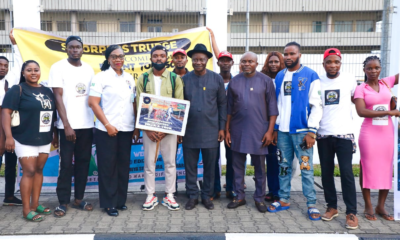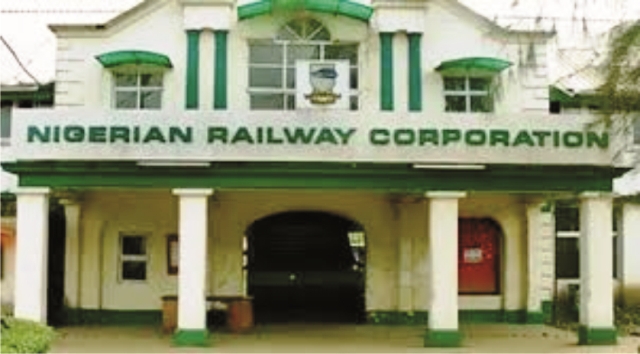Oil & Energy
Periscoping Nigeria’s Economy @ 61
Three days ago, Nigeria celebrated its 61st Independence Anniversary without much fanfare. Apart from the annual ritual of gathering dignitaries at the Eagle Square, Abuja and in every state capital of the country to mark the event, there was no much enthusiasm and euphoria reminiscent of the October 1, 1960 Independence Day.
Like the governor of Rivers State, Chief Nyesom Wike, noted in his Independence Day broadcast, last Friday, there’s not much to be excited about this year’s independence celebration except, perhaps, the fact that “we have remained independent and managed to struggle with our existence for all these years”.
At independence, Nigeria was, no doubt, a great nation with great potential in both human and natural resources. It was a rich and the largest economy in Africa.
Today, given several negative economic indices about the country, can Nigeria truly pride itself as the giant of Africa, again? This is a one million dollar question many Nigerians, including economists and financial experts, may find difficult to answer in the affirmative.
Nigeria may, indeed, take its first position in terms of population, and human/natural endowments in Africa, it is doubtful if it can proudly pride itself as the most progressive economy among its peers, today.
Indices have shown that while many countries that were either at par or trailing behind Nigeria 61 years ago such as Malaysia, Singapore and Ghana, are responding positively to the emerging trend in the global economy, Nigeria appears lethargic, growing at a pace slower than the rate of expansion of its population.
In 1960 for instance, Nigeria’s population was 45.1 million, today, it has grown above 200 million. Yet, only a little above 10 per cent economic progression has been recorded in the last 61 years, to keep up with the population expansion.
It is a sad irony that a country which was once the pride of Africa is, today, one of the poorest countries in the world, with 40 per cent or 83 million of its total population living below the poverty line of less than $1 per day and N137,430 ($381.75) per year, according to the National Bureau of Statistics (NBS) data, last year. And if the World Bank’s income poverty threshold of $3.20 per day is used, Nigeria’s poverty rate is 71 per cent.
It is also a sad commentary that 61 years after attaining independence, Nigeria’s economy which was once strong enough to feed the nation and the rest of Africa is now in tatters, gasping for breath. High inflation, massive unemployment, convulsed social infrastructure and unprecedented debt burden have continued to push more Nigerians into “dehumanising misery and abject poverty”, as Governor Wike rightly noted.
As many businesses are closing shops, many companies are relocating to neighbouring countries like Ghana and South Africa, leading to massive loss of jobs by Nigerians. Twenty seven per cent of Nigeria’s labour force (over 21 million Nigerians) are currently unemployed, according to statistics. Meanwhile, the nation’s currency – the Naira, has practically lost its value as a US dollar which was at par with the Naira in the 1960s is now exchanged for N580.
The grim picture about Nigeria’s economy, inconsistent growth trajectory and poor standard of living have ended up widening the income inequality, increasing the poverty rate and fuelling social tension in the country.
Worst, the Covid-19 pandemic has further worsened Nigeria’s economic growth. As with most other economies around the world, the sharp drop in Nigeria’s Gross Domestic Product (GDP) growth is largely due to the slowdown in economic activity after the country resorted to a lockdown back in April, last year, to curb the spread of the Covid-19 virus.
The accompanying steep drop in oil prices amid a drop in global demand also left Nigeria drastically shorn of earnings given its dependence on the commodity as its biggest revenue source.
For context, the United States slashed its Nigerian crude oil imports oil by 11.67 million barrels in the first five months of 2020, compared to what it bought in the same period of 2019. In fact, in the second quarter of 2020, local oil production dropped to its lowest since 2016, when Nigeria endured a full year of negative growth.
President Muhammadu Buhari himself acknowledged this economic asphyxiation in his Independence Day broadcast when he said “the past eighteen months have been some of the most difficult periods in the history of Nigeria. Since the civil war, I doubt whether we have seen a period of more heightened challenges than what we have witnessed in this period”.
Meanwhile, in spite of several assurances to turn around the fortunes of Nigeria’s economy, the latest economic data shows that the Nigerian government has continued to fall far short of projections in its Economic Recovery and Growth Plan, created in the aftermath of the 2016 recession. From manufacturing, agriculture, solid minerals, oil and gas to service sectors such as aviation and banking, the economy has been like a motion without movement.
Although the economy is not lacking in policy statements and blueprints by successive administrations, positive attitude towards policy implementation appears to be the major albatross militating against its growth.
Save for the telecommunication sector which has emerged as a catalyst for the nation’s economic growth for the past two decades, virtually every other sector is comatose. Power supply is epileptic, aviation industry has continued to wobble with muted ambition, maritime activities are crippled by ports congestion and piracy, trade and investment sector is bitten by the bug of Nigerian factor, the banking industry is feeding fat on a bleeding economy, while the oil and gas sector which has remained the mainstay of the country’s economy for years is shrunk by steep drop in oil prices amid a drop in global demand.
Since 2005 when President Olusegun Obasanjo’s administration liberalised the telecommunication sector, the sector has continued to provide a scaffolding for Nigeria’s broader economic growth. It has emerged as an unbeaten player in the nation’s economy for the past one decade, contributing geometrically to the GDP. Its contribution has almost doubled from 8.5 per cent in 2015 to 14.7 per cent, today.
The NBS latest GDP data shows that the ICT sector grew by 6.47 per cent in Q1 2021, making it the fastest growing sector of the nation’s economy. From a subscriber base of 2, 271, 050 and GDP contributions of 0.85 per cent in 2002, today’s growth has surpassed all projections. Yet, experts say the potential for further growth is huge.
But here appears to be the end of positive stories about Nigeria’s economy. Most other sectors are still finding it difficult to stand on a sound footing. One of such sectors is power. Despite being unbuddled more than a decade ago, the sector has been that of motion without movement over the years. Today, Nigeria’s installed generating capacity is merely 12,500 megawatts (MW) compared to South Africa’s 58, 095 MW, while the electrification rate still lags at 45 per cent, making the sector the missing link in propelling the economy of the country.
It is a sad commentary that a less endowed country like Ghana celebrated one year of uninterrupted power supply more than 10 years ago, whereas Nigeria that prides itself as the giant of Africa has not enjoyed one week of uninterrupted power supply since independence.
Many energy experts have called for a review of the privatisation contract in the face of persistent blackout enveloping the country. For instance, an energy economist at the University of Ibadan, Professor Adeola Adenikinju, lamented that a decade after the defunct Power Holding Company of Nigeria (PHCN) was unbundled and sold to 11 distribution companies (DisCos), Nigeria is still experiencing epileptic power supply amid high tariff.
The aviation sector is not better either. It is one sector that evolves with ambitious developmental policies since independence. One of such policies under the Muhammadu Buhari administration is code-named “Aviation Roadmap”. The policy has components that include a new national carrier, airport concession, aircraft leasing companies, Maintenance Repair and Overhaul (MRO) facility and aerotropolis. Till date, none of these projects has been delivered.
The national carrier, for instance, after its launch in London in 2018, ran into a storm of public criticisms and had to be “temporarily” suspended by the Federal Government. However, there is an indication that the new airline – ‘Nigeria Air’, may hit the sky in 2022.
Similarly, about three years ago, the Federal Executive Council (FEC) approved the concession of four major airports in the country namely Lagos, Abuja, Port Harcourt and Kano. Till date, the facilities are yet to get the requisite patronage from the private sector.
President of the National Union of Air Transport Employees (NUATE), Ben Nnabue, sometimes ago, took a swipe at the aviation sector.
He said that whereas a state government like Akwa Ibom has since successfully launched its airline (Ibom Air) without any fanfare, “our country has woefully failed in its attempt to birth a national carrier after over 10 years of labour and colossal financial waste”.
He continued: “The proposed aircraft leasing company, national aircraft Maintenance, Repair and Overhaul (MRO) facility and aerotropolis development, all flagship programmes of this federal administration, have all suffered paralysis, despite massive support from all stakeholders and informed Nigerians.
“They all followed the same path; bitten by the bug of hidden agenda, suffered the ailment of ill-motive to death, presently in the coffins of infidelity to the national cause, and awaiting to be buried in the grave of onemarism”.
Nnabue also described the airport concession as a travesty, aimed at draining the nation’s treasury and called on the Federal Government to put a halt to it.
Many stakeholders, however, believe that the aviation sector has retained a good measure of stability under the Buhari administration. According to a member of the Aviation Safety Round Table Initiative (ASRTI), Olumide Ohunayo, the sector has sustained safety standards, retained Category-One rating, got good approvals from the Federal Government and received a palliative during the Covid-19 pandemic.
He said the only drawback was the non-implementation of the aviation roadmap components which he believes, can still be achieved before the Buhari administration winds down in 2023.
Another sector capable of revving up the engine of the nation’s economy is trade and investment. Unfortunately, like many other sectors, it is bitten by the bug of the Nigerian factor.
While the sector could be said to have recorded some modest achievements in recent times, many experts believe it has not done well in promoting investment inflows into the nation’s economy.
Chairman and Chief Executive Officer of Pan African Development Corporation, Odilim Enwagbara, said that the sector has not been business-friendly to young entrepreneurs who could have possibly impacted their God-given skills on the economy.
According to him, “The Ministry of Industry, Trade and Investment has failed to pursue a nationalistic economic policy, trade diplomacy that would have protected Nigeria’s trade relations interest”.
He called on the government to “invite all small scale business owners to come together with their technical notch that can promote rapid economic development”.
In the area of agriculture, while it is convenient to say that the sector has been a consistent driver of the non-oil sector contributing 22.35% and 23.78% to the overall GDP in the first and second quarter of 2021, it is instructive to note that the impact of investment in the sector is yet to be felt by Nigerians, as the cost of food items in the market is currently getting out of the reach of the common man in the country. No thanks to the twin evil of insecurity and Covid-19.
As it is usually mouthed by every successive administration at every independence anniversary since 1960, Nigeria cannot truly be said to have been stagnant without recording some economic milestones in the last 61 years.
Under the present administration, for instance, some modest achievements have, indeed, been recorded especially in the area of oil and gas, maritime, transport and aviation, among others. The recent passage and signing of the Petroleum Industry Act, 2021; the launching of the NLNG Train 7, and the Deep Blue projects; the introduction of the Electronic Call-Up System and the launching of the Digital Economy are all efforts in the right direction by the Buhari administration.
But how these lofty initiatives intend to deepen the nation’s economy and make Nigeria go beyond a never-ending potential for becoming a great nation to a truly great one remains to be seen.
By: Boye Salau
Oil & Energy
FG Explains Sulphur Content Review In Diesel Production
The Federal Government has offered explanation with regard to recent changes to fuel sulphur content standards for diesel.
The Government said the change was part of a regional harmonisation effort, not a relaxation of regulations for local refineries.
The Chief Executive, Nigerian Midstream and Downstream Petroleum Regulatory Authority (NMDPRA), Farouk Ahmed, told newsmen that the move was only adhering to a 2020 decision by the Economic Community of West African States (ECOWAS) which mandated a gradual shift to cleaner fuels across the region.
Ahmed said the new limits comply with the decision by ECOWAS that mandated stricter fuel specifications, with enforcement starting in January 2021 for non-ECOWAS imports and January 2025 for ECOWAS refineries.
“We are merely implementing the ECOWAS decision adopted in 2020. So, a local refinery with a 650 ppm sulphur in its product is permissible and safe under the ECOWAS rule until January next year where a uniform standard would apply to both the locally refined and imported products outside West Africa”, Ahmed said.
He said importers were notified of the progressive reduction in allowable sulphur content, reaching 200 ppm this month from 300 ppm in February, well before the giant Dangote refinery began supplying diesel.
Recall that an S&P Global report, last week, noted a significant shift in the West African fuel market after Nigeria altered its maximum diesel sulphur content from 200 parts per million (ppm) to around 650 ppm, sparking concerns it might be lowering its standards to accommodate domestically produced diesel which exceeds the 200 ppm cap.
High sulphur content in fuels can damage engines and contribute to air pollution. Nevertheless, the ECOWAS rule currently allows locally produced fuel to have a higher sulphur content until January 2025.
At that point, a uniform standard of below 5 ppm will apply to both domestic refining and imports from outside West Africa.
Importers were previously permitted to bring in diesel with a sulphur content between 1,500 ppm and 3,000 ppm.
It would be noted that the shift to cleaner fuels aligns with global environmental efforts and ensures a level playing field for regional refiners.
Oil & Energy
PHED Implements April 2024 Supplementary Order To MYTO
The Port Harcourt Electricity Distribution (PHED) plc says it has commenced implementation of the April 2024 Supplementary Order to the MYTO in its franchise area while assuring customers of improved service delivery.
The Supplementary order, which took effect on April 3, 2024, emphasizes provisions of the MYTO applicable to customers on the Band A segment taking into consideration other favorable obligations by the service provider to Band A customers.
The Head, Corporate Communications of the company, Olubukola Ilvebare, revealed that under the new tariff regime, customers on Band A Feeders who typically receive a minimum supply of power for 20hours per day, would now be obliged to pay N225/kwh.
“According to the Order, this new tariff is modeled to cushion the effects of recent shifts in key economic indices such as inflation rates, foreign exchange rates, gas prices, as well as enable improved delivery of other responsibilities across the value chain which impact operational efficiencies and ability to reliably supply power to esteemed customers.
“PHED assures Band A customers of full compliance with the objectives of the new tariff order”, he stated.
Ilvebare also said the management team was committed to delivering of optimal and quality services in this cost reflective dispensation.
The PHED further informed its esteemed customers on the other service Bands of B, C D & E, that their tariff remains unchanged, adding that the recently implemented supplementary order was only APPLICABLE to customers on Band A Feeders.
Oil & Energy
PH Refinery: NNPCL Signs Agreement For 100,000bpd-Capacity Facility Construction

The Nigerian National Petroleum Company Ltd (NNPCL) has announced the signing of an agreement with African Refinery for a share subscription agreement with Port-Harcourt Refinery.
The agreement would see the co-location of a 100,000bpd refinery within the Port-Harcourt Refinery complex.
This was disclosed in a press statement on the company’s official X handle detailing the nitty-gritty of the deal.
According to the NNPCL, the new refinery, when operational, would produce PMS, AGO, ATK, LPG for both the local and international markets.
It stated, “NNPC Limited’s moves to boost local refining capacity witnessed a boost today with the signing of share subscription agreement between NNPC Limited and African Refinery Port Harcourt Limited for the co-location of a 100,000bpd capacity refinery within the PHRC complex.
“The signing of the agreement is a significant step towards setting in motion the process of building a new refinery which, when fully operational, will supply PMS, AGO, ATK, LPG, and other petroleum products to the local and international markets and provide employment opportunities for Nigerians.
By: Lady Godknows Ogbulu
-
Politics3 days ago
How We Saved N2.3bn From LG Reforms – Diri
-
Sports3 days ago
WADA Plans Review Of Failed Tests
-

 News11 hours ago
News11 hours agoFubara Wants Rivers Youths To Acquire Useful Skills
-

 Maritime10 hours ago
Maritime10 hours agoUnfair Treatment Of Seafarers Bothers IMO
-

 News4 days ago
News4 days ago524 Firms Bid For NRC’s 2024 Capital Procurement -Okhiria
-
Nation3 days ago
Fubara Has Rekindled Rivers Hope-Former Envoy
-

 Rivers13 hours ago
Rivers13 hours agoCommittee Concludes Open Verification Of MIle 1 Market Allotees
-

 Education10 hours ago
Education10 hours agoBauchi Govt Threatens To Revoke Scholarship Of Unserious Students

